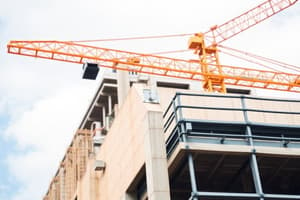Podcast
Questions and Answers
What is the primary function of footings in a building's substructure?
What is the primary function of footings in a building's substructure?
- To distribute loads evenly and provide a solid base
- To transfer loads from the building to the ground (correct)
- To provide horizontal support and separation
- To provide protection from the elements and structural support
What is a key consideration for building regulations in relation to a building's substructure?
What is a key consideration for building regulations in relation to a building's substructure?
- Fire resistance and sound insulation
- Energy efficiency and structural integrity
- Accessibility and safety standards for occupants
- Drainage, waterproofing, and insulation (correct)
Which component of a building's superstructure provides vertical support and enclosure?
Which component of a building's superstructure provides vertical support and enclosure?
- Floors
- Foundations
- Roofs
- Walls (correct)
What is a primary concern for building regulations in relation to a building's superstructure?
What is a primary concern for building regulations in relation to a building's superstructure?
What is the main difference between a building's substructure and superstructure?
What is the main difference between a building's substructure and superstructure?
Why do building regulations for substructure and superstructure vary depending on the country, region, or local authority?
Why do building regulations for substructure and superstructure vary depending on the country, region, or local authority?
Flashcards are hidden until you start studying
Study Notes
Building Regulations: Substructure and Superstructure
Substructure:
- Refers to the lower portion of a building, below ground level
- Includes the foundation, basement, and any underground structures
- Key components:
- Footings: transfer loads from the building to the ground
- Foundations: distribute loads evenly and provide a solid base
- Slabs: horizontal structures that transfer loads to the ground
- Building regulations for substructure:
- Ensure adequate load-bearing capacity
- Prevent settlement and cracking
- Meet requirements for drainage, waterproofing, and insulation
Superstructure:
- Refers to the upper portion of a building, above ground level
- Includes the walls, floors, roofs, and any above-ground structures
- Key components:
- Walls: provide vertical support and enclosure
- Floors: provide horizontal support and separation
- Roofs: provide protection from the elements and structural support
- Building regulations for superstructure:
- Ensure adequate structural integrity and stability
- Meet requirements for fire resistance, sound insulation, and energy efficiency
- Comply with accessibility and safety standards for occupants
Note: These notes provide a general overview of the key components and building regulations for substructure and superstructure. Specific regulations may vary depending on the country, region, or local authority.
Studying That Suits You
Use AI to generate personalized quizzes and flashcards to suit your learning preferences.




